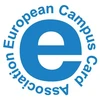About the Project

The European Education Connectivity Solution Project (EECS Project), which was funded under the FP7 – Research for SME’s, was undertaken by a consortium partnership of three European SME’s (small to medium enterprises) and three RTD’s (research and technological development) located in four European countries. It commenced in June 2009 and was delivered in the two-year period to the end of May 2011 at a total cost of €1.4834m.
This project was established to research and develop a prototype solution for a secure, standardised, interoperable campus card system that would overcome the barriers that existed in relation to the absence of standards and interoperability between campus card systems across Europe. In addition, the concept enabled the provision of services on a cross-border basis and supported academic mobility by facilitating the electronic transmission of student data between HEIs.
This research and development project:
- Researched the current and potential European campus card market, the current state of the art and future requirements;
- Applied the research results to develop a design for an integrated, standard-based, EECS Campus Card prototype which includes three component software modules;
- Card Application Management System (CAMS)
- Client Application Interface (CAI)
- Student Connectivity Module (SCM)
- Built a working EECS prototype that provided access to services on a cross-border basis and tested the secure transfer and sharing of student records and other information between HE institutions across Europe;
- Developed a marketing and dissemination plan to inform potential customers of the new concept for campus card systems.
The outcomes from the EECS project achieved the following:
- It successfully developed a prototype for a secure and standardised campus card management system that serves the unique needs and requirements of European HE institutions;
- The project has proved that student mobility and access to services on a cross-border basis can be facilitated by interoperable campus card systems, thus helping to overcome obstacles to the effective exercise of free movement of students and academics and fulfilling one of the main objectives of the 1999 Bologna Declaration;
- The architecture and technical design of the EECS prototype has no comparison, and represented a breakthrough in dealing with the problems of standards and interoperability that have up to now inhibited the development of the campus card market;
- It has opened the way for new commercial opportunities by overcoming some of the current barriers to exploitation of the market by the Service Providers and
The concept and outcomes from the project are an important step in the process of establishing a standardised interoperability system that can provide student mobility and access to services on a cross border basis. The prototype, which was tested in a real live working environment, provided a standardised interface that facilitated the electronic transmission of student data between two Educational Institutions in different countries (Poland and Ireland) under the rules of the Erasmus programme framework. The test validated that students were able to use their home HEI student card in the visiting HEI to access a range of physical services on the campus and transfer academic data electronically. The consortium SME partners have subsequently developed the CAMS and CAI modules into a successful commercial product that are in operation in HEIs in Ireland since 2012. However, the SCM module, which was a key innovation that supports access to services on a cross-border basis and the transfer of data requires further development beyond the prototype stage before commercialisation.
